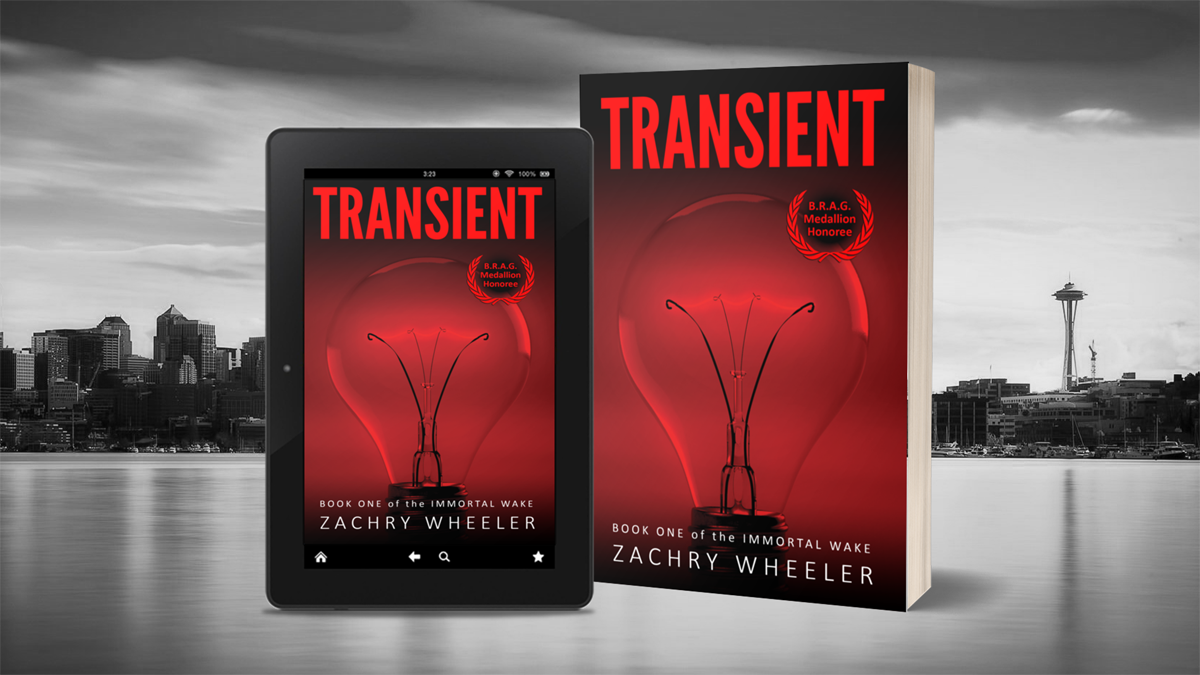When I mention that my debut novel took 10 years to write and publish, people give me funny looks. I’m not being cute or overly dramatic, just stating the fact that I spent the better part of a decade building the world behind the words. The backstory that led to Transient is strange, tedious, and sometimes bizarre, but it remains a pivotal period that shaped my authorship. And so, I thought it would be interesting to share it.
Back in the early 2000s, music was my primary creative outlet and I spent a lot of time promoting my band. I worked as a web developer and the only writing I did was for work (wikis, manuals, etc.). I took long walks during lunch, where I would ponder ideas for new songs and stage shows. During one such walk, I got a nutty idea.

At the time, vampire romance novels were hugely popular. A common critique was that authors put too much emphasis on the love story and too little on the lore, which was often explained away with cheesy mystical nonsense. I get that authors need to entice readers with brooding beasts and supernatural love triangles, but the world-building always suffered as a result. I knew nothing about writing back then and even I could pick up on that blunder.
So I asked myself, what if vampires were real? As in, scientifically plausible. I had no story in mind, I just wanted better lore.
The idea stuck in my craw and I just couldn’t shake it. To satisfy my own curiosity, I started delving into research. What began as a casual musing quickly turned into a pseudo research paper. Before long, I had pages full of logistics and medical science.
Then it occurred to me … this would make a great story.
And so I wrote it.
I didn’t plan anything or produce an outline, just puked it out on paper. I created a first draft of a short novel, having no clue how to write fiction, let alone write it well. When I finished, I had a steaming pile of bad writing, but I didn’t know any better. And when I say bad, I mean really bad. I had abused every crutch and cliché in the book. If you search for “the most common amateur writing mistakes,” I did them all and then some. It was a study in how not to write. Once I understood how blindingly awful it was, I set the manuscript aside and went back to music, assuming I sucked at writing.
Then something magical happened … the American Craft Beer Movement exploded.
Funny enough, I have to credit beer for teaching me how to write. Once upon a time, I was really into craft brews. And during that time, review sites had a snobbish undertone that I found distasteful. Being a web developer, I decided to create a competitor site that focused less on the critique and more on the overall experience.
I dove into this project hard and strong, to the point where even music took a backseat. Over the next several years, I wrote hundreds of articles and gained a notable following. Breweries even mailed me beer because they appreciated my tactful approach to reviewing. That’s when it hit me. I’m actually getting pretty good at this. My writing had improved dramatically. As the old saying goes, how do you get to Carnegie Hall? Practice, practice, practice.
The writing bug bit me hard. I started to research the fundamentals of good writing (a deep rabbit hole that I have yet to emerge from). I also decided to read more. Not that I didn’t read at all, I was just more of a non-fiction guy. I picked up Asimov’s Foundation series and the rest, as they say, was history.
Out of curiosity, I decided to revisit that first draft of Transient. Much to my surprise, not only could I articulate why it was bad, I actually knew how to fix it. And so, that became my new writing project. I rewrote it stem to stern at least five times. I put it through more rounds of editing than I care to admit. I joined a writers group and continued to edit in conjunction with new insights. Before long, I had revised it into a decent manuscript. But, I still had no idea if it was good enough to publish. So with nothing to lose, I decided to query literary agents to see exactly where I stood.
Six months later, I had submitted over a hundred queries and received a great deal of positive feedback. But sadly, no takers. However, one agent cited a major flaw that I hadn’t considered. The manuscript clocked in at 60K words, well short of the standard 80-120K range for science fiction. But on the flip side, it fit snuggly into the young adult range. That got the brain wheels turning and I considered yet another rewrite as a YA novel. The more I thought about the story, the more it made sense for the protagonist to be a young adult.
And so, I rewrote it … again.
Even at this point, Transient almost didn’t see the light of day. Having learned a crap ton about better writing, I wanted to apply it to a fresh manuscript. I had written the first few chapters of what would become Max and the Multiverse, which I viewed as a much better candidate for a debut novel. I shelved Transient in order to focus on a more engaging project. I finished Max and started submitting it to literary agents.
While that simmered, I revisited the Transient manuscript and finally decided that it was good enough to see to fruition. I opted to self-publish, using the book as an experimental tuition. After all, Max was my primary focus and I considered Transient a side project. But, I thought it would be nice to have something to promote while Max was lingering in query hell. That is the one and only reason why I decided to publish Transient. And so, I put it through one final round of edits and started the process.
A few months later, Transient was released on Amazon and I was officially a published author. To this day, it still feels strange to hold the book and think back to those lunchtime walks. What a ride. So if you decide to give Transient a read, know that a decade of trial and tribulation went into its publication (along with plenty of good beer).


